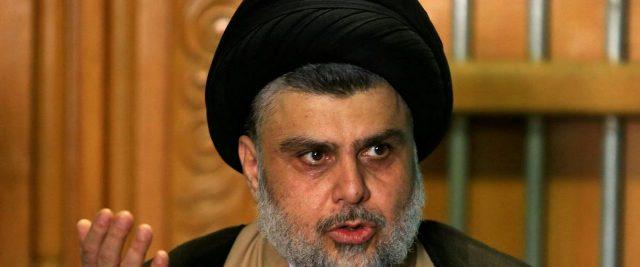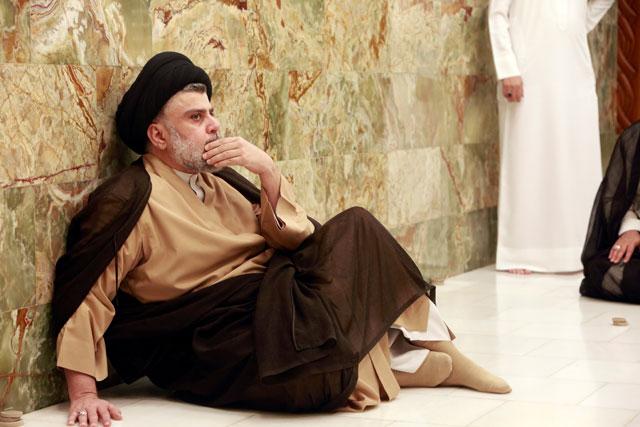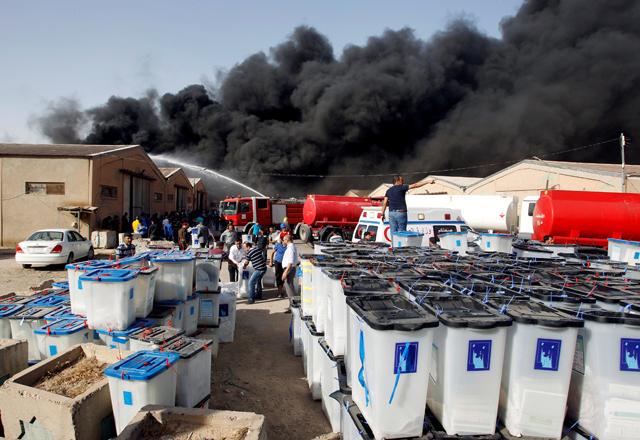You are here
Election recount, Baghdad bomb fuel Iraq tensions
By Thomson Reuters Foundation - Jun 08,2018 - Last updated at Jun 08,2018

People gather at the site of an explosion in Baghdad's Sadr City district, Iraq, on Thursday (Reuters photo)
BAGHDAD — Iraqi cleric Moqtada Al Sadr called on his followers on Thursday to remain calm after an explosion killed 18 people in his main stronghold in Baghdad just hours after parliament called for a recount of votes in an election his bloc won.
Sadr, a nationalist who tapped growing resentment with Iran, scored a surprise victory in the May 12 vote by promising to fight corruption and improve services. He said in a statement that a committee would be formed to investigate the blast, with findings presented to him within three days.
He called for "patience and self-control", the statement from his office said.
At least 18 people were killed and more than 90 wounded in Sadr City, a blast the Interior Ministry said was the result of the detonation of an ammunitions cache. Security forces have opened their own investigation.
Prime Minister Haider Al Abadi said in a statement storing ammunition in a residential area was a crime and ordered the Interior Ministry to investigate the incident and take legal action against those who had done so.
Some of Sadr's political opponents had suggested on social media the ammunitions cache belonged to his Saraya Al Salam (Peace Companies) militia.
Sadr had suggested in December that the militia was ready to hand over its weapons to the government after the defeat of Daesh militants.
Hours before the explosion, Iraq's parliament passed a law on Wednesday ordering a nationwide manual recount of votes in the parliamentary election, lawmakers said, a day after Abadi said there had been serious violations.
The move could undermine Sadr, who has in the past mobilised tens of thousands of followers to protest against government policies he opposed, and pits the government and parliament against the country's independent elections commission.
Sadr’s top aide, Dhiaa Al Asadi, said in a Tweet that while any fraud or violations in the electoral process should be condemned, it should be handled by the independent high elections commission and the federal court.
He also expressed concerns that some parties were trying to sabotage Sadr’s victory.
“Losers in the recent elections shouldn’t hijack or manipulate the parliament. Otherwise, it is a conflict of interests,” he said.
Sadr has always been seen as a wildcard in Iraq’s turbulent politics, which is often driven by sectarian interests.
His Mehdi Army militia staged two violent uprisings against United States occupation forces after the invasion and Iraqi and US officials described him at the time as the biggest security threat in Iraq.
The defeat of Daesh in December had raised hopes that the country could ease sectarian and political tensions and find a formula for stability, which has remained elusive since the 2003 US-led invasion that toppled Saddam Hussein.
But tensions over the election raised the prospect of more turmoil in Iraq, which has close ties with the United States and Iran, who compete for power in Iraq, a major oil producer.
Iraq’s judiciary said in a statement on Thursday a high-ranking committee of judges had moved into the headquarters of the election commission to prepare to run it following parliament’s vote to suspend the commission’s leaders and replace them with judges.
The commission said it would appeal against the law passed by parliament ordering a recount and suspending its leadership.
“The board of commissioners will use its constitutional and legal right to appeal against the amendment to the election law because it contains violations and is not in harmony with the constitution,” the independent high elections commission’s board of commissioners said in a statement.
Related Articles
BAGHDAD - Iraqi cleric Moqtada al-Sadr called on Friday for a nationwide disarmament campaign and announced his Baghdad stronghold would be
BAGHDAD — Nationalist cleric Moqtada Al Sadr, a long-time adversary of the United States, led in Iraq’s parliamentary election with more tha
BAGHDAD — Shiite cleric Moqtada Al Sadr urged Iraqis on Monday to unite rather than squabble over a possible rerun of the election his bloc

















